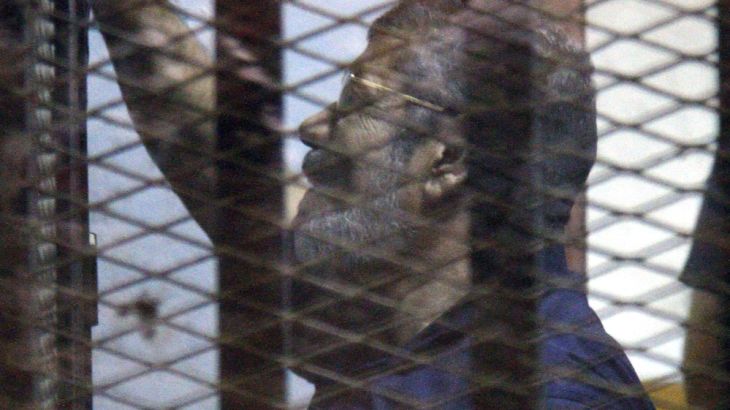EU and US denounce Morsi death sentence
Verdict described as “inhumane”, “inconsistent with Egypt’s international obligations” and stemming from flawed trial.

The European Union and the United States have denounced the death sentences handed to deposed president Mohamed Morsi and more than 100 others by an Egyptian court.
The court on Saturday delivered the death sentences for their role in a mass jailbreak during the 2011 uprising against Hosni Mubarak.
Keep reading
list of 4 itemsWhat challenges do Turkey, Egypt face in restoring ties?
Egypt upholds life sentences for 10 Muslim Brotherhood figures
Egypt and Turkey hold ‘frank’ official talks, first since 2013
The EU said the penalty stemmed from a flawed trial and was “cruel and inhumane”.
“The court decision to seek the death penalty… was taken at the end of a mass trial that was not in line with Egypt’s obligations under international law,” the EU’s top diplomat Federica Mogherini said in a statement.
Mogherini added that Egypt had to guarantee defendants’ rights to a fair trial and to an independent investigation. Her statement said the EU believed the sentence would be revised upon an appeal.
The US expressed “deep concern” after the verdict.
“We have consistently spoken out against the practice of mass trials and sentences, which are conducted in a manner that is inconsistent with Egypt’s international obligations and the rule of law,” an unnamed state department official said on Sunday.
Noting that they were preliminary sentences, the official added: “We continue to stress the need for due process and individualised judicial processes for all Egyptians in the interests of justice.”
The court’s verdict on Saturday has already prompted immediate condemnations from Amnesty International and the Turkish president.
Many of those sentenced on Saturday were tried in absentia.
The sentences are subject to legal appeal and the court will pronounce its final decision on June 2, since under Egyptian law, death sentences are referred to the grand mufti, the government’s interpreter of Islamic law.
Egypt remains one of Washington’s closest security allies in the Middle East. Relations cooled after
Morsi was overthrown by the military nearly two years ago, but ties with Abdel Fattah el-Sisi, his successor, have steadily improved.
In late March, US President Barack Obama lifted a hold on a supply of arms to Cairo, authorising deliveries of US weapons valued at over $1.3bn.
They're insisting on issuing these verdicts against anyone who participated in the January 25 Revolution ... all of the verdicts fail to meet international standards of law ... they are farcical and will be dismissed as a failing of the coup.
Widespread condemnation
The Muslim Brotherhood, an Islamist group to which Morsi belonged before it was banned, slammed Saturday’s verdicts, calling them “farcical”.
“They’re insisting on issuing these verdicts against anyone who participated in the January 25 Revolution … all of the verdicts fail to meet international standards of law … they are farcical and will be dismissed as a failing of the coup,” Mohamed Soudan, a senior member of the Brotherhood who fled Egypt to the UK after Morsi’s overthrow, told Al Jazeera.
Similarly, Turkish President Recep Tayyip Erdogan criticised Egypt over the decision and accused the West of hypocrisy, according to the state-run Anatolian news agency.
“While the West is abolishing the death penalty, they are just watching the continuation of death sentences in Egypt. They don’t do anything about it,” Erdogan was quoted as saying.
Human rights group Amnesty International said the trial was a “charade” and based on “void procedures”.
“Condemning Mohamed Morsi to death after more grossly unfair trials shows a complete disregard for human rights … he was held for months incommunicado without judicial oversight and that he didn’t have a lawyer to represent him,” the organisation said in a statement.
Meanwhile, Yehia Ghanem, a former managing editor of the Al Ahram newspaper, told Al Jazeera the death sentence was an expected outcome and that the decision of the grand mufti was “not compelling to the judiciary”.
Charged with collusion
Morsi, who was overthrown by the army in 2013 amid protests against his government, was spared the death sentence in the first of two trials that concluded on Thursday, in which the court advised death sentences for 16 defendants on espionage charges.
They had been charged with colluding with foreign powers, the Palestinian group Hamas and Iran, to destabilise Egypt.
Last month, an Egypt court sentenced Morsi and 12 other defendants to 20 years in prison for ordering the arrest and torture of protesters in clashes outside the presidential palace in December 2012.
The court acquitted the former president of murder charges that could have seen him face the death penalty.